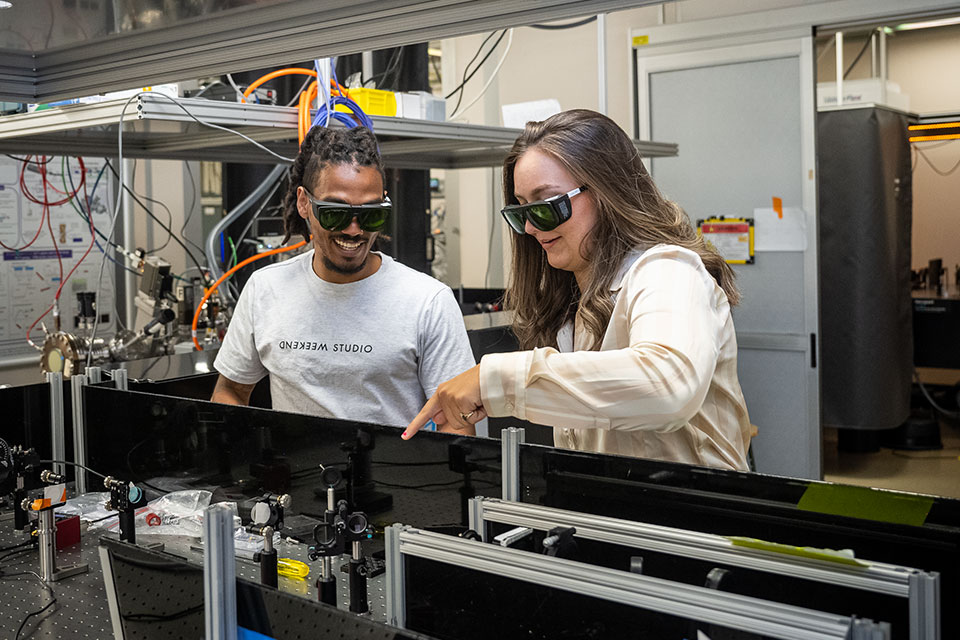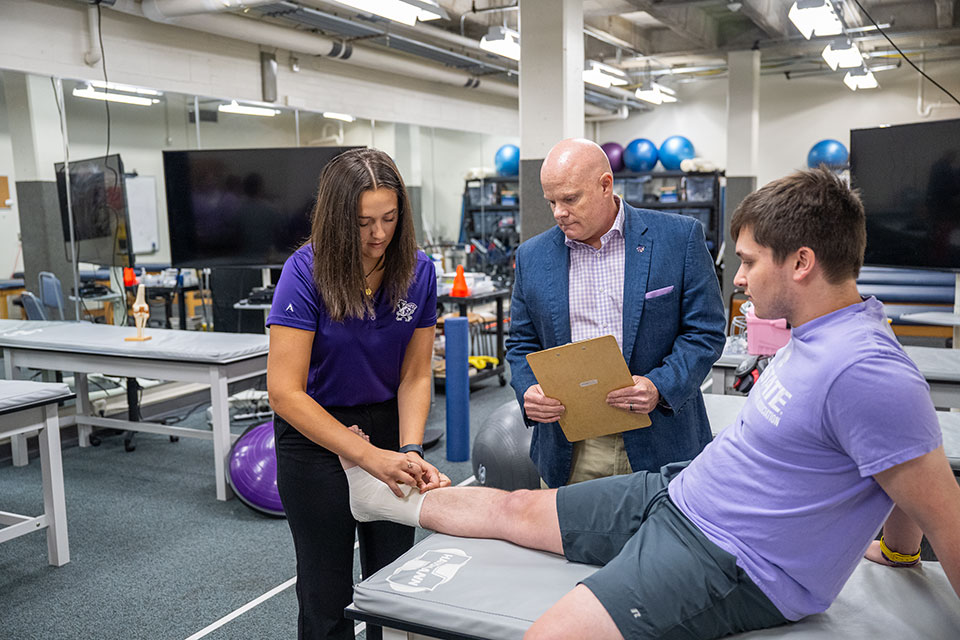Applied learning at K-State gives students career confidence and clarity, valuable skills

When students begin their college careers at Kansas State University, they come prepared to do coursework that will lead them toward degrees. But when those Wildcats graduate, they leave the spot they love full well with more than degrees: They enter their futures with valuable real-world skills honed during hands-on experiences supported by K-State.
The university prioritized providing students with these opportunities, called applied learning experiences, as an imperative of the Next-Gen K-State strategic plan.
Applied learning is an educational approach that involves an ongoing cycle of purposeful experience, intentional observation and critical reflection. Students apply knowledge and skills gained from academic learning to practical settings, projects, research experiences and creative activities, allowing learners to develop new understandings and apply them to new situations.
“K-State’s commitment to applied learning is truly woven into the fabric of our institution,” said Jesse Perez Mendez, provost and executive vice president. “Our reaffirmed focus on applied learning experiences through our Next-Gen K-State strategic plan is all about elevating these opportunities for our students — and forging the new partnerships and pathways that enhance the portfolio of experiences that we offer. Ultimately, this is allowing our students to choose from an incredible line-up of relevant and purposeful applied learning experiences that bolster each student’s personal development and help them reach their goals.”
Applied learning has taken place at K-State since its charter. These experiences have generated an educated citizenry equipped with the skills necessary to tackle grand challenges in Kansas and around the world. As K-State strives to become the next-generation land-grant university, ensuring that all learners have access to sustained, purposeful and reflective experiences in a consistent and accessible manner is imperative.
Thanks to the university's Applied Learning Experiences team, the 2030 goal of providing every degree-seeking student with an applied learning experience before graduation is well within reach.
Applied learning benefits students in myriad ways
Research shows that students benefit from completing an applied learning experience during their first year of college and after graduation.
According to the American Association of Colleges and Universities, students who complete one or more applied learning experiences tend to earn higher GPAs in their first year. Additionally, following graduation, students who have completed an applied learning experience earn 30% more than peers who don’t, according to a joint report by NACE, AAC&U and the National Society for Experiential Education.
Anne Halstead, a sophomore in political science and art history from Topeka, participated in an applied learning experience in spring 2025, serving in leadership on campus. She served as senator representing the College of Arts and Sciences on student government. During her experience she was able to work with other student leaders and constituents and be a voice representing her college to make an impact on policy changes at the university.
Reflecting on her experience, she has not only seen the impact she made in the community but also in her studies at K-State.
“The experience has given me tools and assets to help accomplish my schoolwork that I didn’t have before,” said Halstead. “It has helped me with group projects in other courses I am taking and has taught me to work better with other classmates to find solutions.”
Through applied learning experiences at K-State, students gain confidence and clarity in future career paths — and competence and purpose as they pursue them.
Sarah Hemenway, an English major from Kansas City, Missouri, participated in an applied learning experience with Habitat for Humanity through K-State's nonprofit leadership program. Serving in a communications role, she planned publicity efforts for the organization as well as a complete review and update of information on the local Habitat for Humanity website.
Hemenway said the experience helped her build skills in written communication, website coding and event planning — skills she's already used in her classes and can apply to future opportunities as well.

Defining applied learning experiences at K-State
Ensuring students are receiving the best opportunities for hands-on learning possible, the Applied Learning Experiences team and its steering committee created a framework for the experiences.
This framework is a tool for learners and instructors to understand what they can expect to commit to and gain from an applied learning experience. The framework has three requirements — each applied learning experience must:
- Involve learner engagement at least equivalent to the intensity, depth, and/or time commitment of a one-credit-hour course, approximately equal to 45 hours of engagement.
- Be intentionally designed to develop professional, technical, personal and/or interpersonal skills. These learning outcomes and competencies are supported and assessed.
- Incorporate purposeful experience, active engagement and critical reflection. The learner is responsible for sharing and communicating new understandings and their application to new situations.
Along with the framework, the Applied Learning Experiences team identified six types of experiences for students to consider. While any educationally relevant experience that meets the framework could count as applied learning, these six experiences are a great way for students to consider their options.
Community-engaged learning
Integration of academic learning with relevant, community-based work, that engages students, faculty, staff and community members through reciprocal partnership. This work connects academic, civic and personal learning goals to public purposes through critical reflection
Creative
Learners demonstrate mastery of professional, relevant or transferable competencies through the practicing and honing of skills and then applying them to an innovative challenge or inspired design. The process is reflective and characterized by a high degree of critical thinking, problem solving, adaptability and risk-taking.
Global
Global experiences provide purposeful opportunities that include, but are not limited to, gaining an awareness of other cultures and backgrounds, developing or enhancing intercultural communication and critical thinking skills, broadening global perspectives in one’s field of study and respectfully engaging with diverse and international communities.
Internship
Educationally relevant work experience that integrates knowledge and theory with practical application and skill development in a professional setting. The experience includes direct supervision, learning objectives, and has a defined beginning and ending. Other internship-related terms include co-op, fieldwork, clinical experience and practicum.
Leadership
An experience in which a learner is responsible for influencing positive change within a group. Throughout the experience, a leader will engage in, and promote within others, competencies that may include clarified values, self-awareness, social and civic responsibility, effective communication, intentional collaboration and adaptive thinking. Experiences may be academic or extracurricular, related to a formal position of academic relevance or involve engagement in an authentic community challenge.
Undergraduate research
Mentored scholarly investigation or creative inquiry conducted by undergraduates that deepens understanding and contributes knowledge. Scholarly or artistic contributions may be shared through a university seminar, poster/oral conference presentation, performance, exhibition and/or publication.